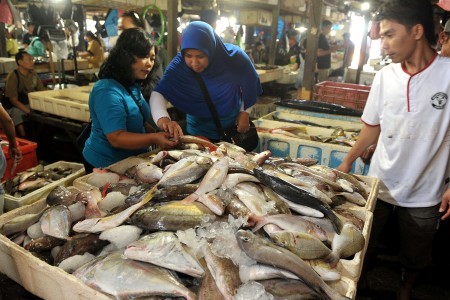Popular Reads
Top Results
Can't find what you're looking for?
View all search resultsPopular Reads
Top Results
Can't find what you're looking for?
View all search resultsQuarantine inspections tightened as agricultural trade booms
Change text size
Gift Premium Articles
to Anyone
T
he growing trade in cattle and crops following trade agreements with several economies has increased the risk of diseases spreading across country borders.
In anticipation of potential contagion, the Agriculture Ministry’s Quarantine Agency said it had tightened its inspections of horticultural commodities for the sake of consumer protection.
Indonesia has recently seen an increase in exports of tropical fruits, such as mango, dragon fruit and mangosteen, to Australia and China.
“With regard to the trade agreement, each country must conduct a strict inspection in a bid to ensure consumer protection in the respective countries,” said Arifin Tasrif, who heads the agency’s center for quarantine compliance, cooperation and information.
Arifin said the trade agreement required each signatory to inspect horticultural products through sanitary and phytosanitary (SPS) measures to protect humans, animals and plants from diseases, pests or contaminants.
"We continue to supervise any agreement. For example, last year we signed an agreement with Australia to export commodities such as mangosteen and snake fruit," he added.
Last year, Indonesia earned US$668 million from the export of cacao, mangosteen, snake fruit and coffee to Australia.
In the same year, it had also exported coconut flour, mangoes, honey, cacao, tea and coffee with a value of $3 billion to China and Hong Kong following the ASEAN-China FTA, which was signed in 2002 by eleven countries.
"Meanwhile, the Indonesia-European Union CEPA agreement has entered its final stage and is targeted to be completed this year," Arifin said, adding that the agreement was expected to add value and competitiveness to Indonesia's agricultural export commodities.
Indonesian Fruit and Vegetable Exporters and Importers Association (ASEIBSSINDO) secretary-general Hendra Juwono said fruit traders had recently seen strong profit after exporting great volumes of tropical fruit, such as mango, pineapple, mangosteen and sweet potato.
“We have a lot of potential for fruit exports. It is surprising for most Indonesians to learn that even our Kaffir lime has lots of potential,” he said, adding that the association recorded a 125 percent increase in its fruit and vegetable exports last year.
He said the vegan lifestyle trend had also led to increasing demand for particular tropical fruits. “In Europe and the US, jackfruit is now a substitute for meat. A distinct lifestyle has come into existence and is preferred by some millennials,” Hendra said.
According to Hendra, exports could have been increased a long time ago if the government had been consistent in executing the agreement.
“We had been left behind, because our government was very slow in processing the government-to-government [G2G] deal. The negotiations took place two years ago, but they needed the past two years to [implement the agreement],” he said.
Hendra said business-to-business [B2B] deals could only to take place once the G2G had been settled. “Without that protocol, we couldn’t trade,” he said.
Separately, Agriculture Minister Andi Amran Sulaiman said the ministry had released exports of 42 types of horticultural commodities to 12 countries.
“The volume is approximately 10,000 tons per year to 12 economies, including Singapore, Malaysia, Thailand, Hong Kong, China, United Arab Emirates, Saudi Arabia, Pakistan, India, Bangladesh, Australia and New Zealand,” Amran said in a statement.
The minister added that commodity exports would continue to increase after the government reformed a number of policies, including the 24-hour online single submission licensing system. The ministry has revoked 291 regulations believed to thwart export licenses. "Thanks to these policies, the mangosteen exports rose 500 percent," he said.
According to the ministry, horticulture exports increased by 11.92 percent last year with a value of more than Rp 5 trillion to 113 destination countries. Moreover, vegetable exports rose 4.8 percent, flowers exports rose 7.03 percent and fruit exports rose by as much as 26.27 percent. (das)










